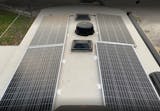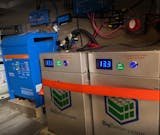What is a 24-volt battery?
Everyday items like watches, remote controls, cars, and toys all require batteries in some capacity. Among the many different types of rechargeable batteries, lithium-ion batteries are one of the most commonly used, and their use grows more prevalent every day as the years go by. Through a redox reaction, lithium-ion batteries transform chemical energy into electrical energy.
To better understand the idea behind a 24v lithium ion battery, let's first examine what voltage means. The difference in electrical potential between the battery's anode (+) and cathode (-) terminals is known as battery voltage. The voltage increases with the size of the differential. 24v denotes that the battery can produce 24v when a nominal load is applied. A rechargeable battery is a 24-volt lithium-ion battery.
A 24v lithium-ion battery is a rechargeable battery that can be used for a wide range of applications. It is mainly used in electric vehicles and stationary power storage. The battery has many advantages over other types of batteries, such as lead acid and nickel-cadmium batteries. The battery is rechargeable and can be recharged with a variety of charging methods, including solar, wind, hydroelectric power or natural gas. This makes it an environmentally friendly option for stationary energy storage systems where the goal is to reduce emissions and dependence on fossil fuels.
What is a 24-volt battery used for?
A 24-volt battery is used for a wide range of purposes. Utilizing a solar power system, a 24v lithium-ion battery is perfect for storing energy for a residence. When electricity prices are high, having a solar power system at home is advantageous.
The 24v lithium-ion battery can be used to store energy for electrical tools like the electric drill. Because it can store power for longer periods of time, the battery is perfect for electrical instruments. Additionally, lithium-ion batteries are quite lightweight, which is exactly what you need while using electrical tools.
RV lithium batteries, or recreational vehicles, are growing in popularity in the automotive business today. The main drawbacks of RVs have been eradicated thanks to technological improvements. Owning an RV used to be expensive because it required fuel to operate (oil). Fuel is not environmentally friendly because it costs a lot and cannot be recycled. Its price also changes drastically and abruptly. The RV solar system can also power all the devices you need to use in your RV, just as a household solar system can. By using the sun during the day, you can charge the lithium RV battery for free and enjoy its stored energy at night.
How many cells does a 24v industrial battery have?
Like lead-acid batteries and many other battery types, lithium batteries are an assembly made up of many cells. Lithium battery cells have a nominal voltage of 3.2V compared to lead acid batteries' 2V/cell. As a result, four cells connected in series will normally provide a 12V battery. As a result, a LiFePO4's nominal voltage will increase to 12.8V. A 24V battery with a nominal voltage of 25.6V is created by connecting eight cells in series, while a 48V battery with a nominal voltage of 51.2V is created by connecting sixteen cells in series. These voltages function flawlessly with standard 12V, 24V, and 48V inverters.
What is the difference between a 12v and 24v battery?
The quantity of power contained in a battery determines the primary difference between a 12V and a 24V battery. With the same "Ah" rating as a 12V battery, a 24V battery has twice the capacity. Because battery voltage and battery ampere-hour are multiplied to produce the amount of energy stored in the battery.
Systems with 12v lithium-ion batteries are quite widespread. Since most automotive parts are 12V-compatible, most automobiles run on 12V systems. For the batteries to be charged, the generators provide 12V. The majority of RV-related products, including refrigerators and all lighting, operate on 12V as well. 12V systems just need a single battery and are ideal for low-power uses with limited cable lines. Due to its simplicity and compatibility with the majority of RV items, 12-volt systems are excellent. It's simple to connect them to smaller solar systems as well.
The use of smaller diameter wire and a two-fold reduction in amperage are advantages of 24V systems. The cost of wiring and the amount of area required to run wiring can both be decreased by using smaller diameter wires. This is crucial when there are extensive wire runs involved. As a result, the higher voltage requires less current to produce the same amount of power. Since we run less current or amps, we can use a smaller wire. Likewise, power lines transmit high voltages due to this reason. The wires can carry much more power and be much smaller! In addition to having shorter wires, 24 volt systems run motors and inverters more effectively. Frequently, a solar charge controller that runs on 24V instead of 12V may take twice as much solar input.
Frequently Asked Questions
Q. What are the benefits of using a 24-volt battery?
A. The main benefit of using a 24-volt battery is that it is more efficient. This means that it will last longer than other batteries because its voltage is higher. The 24-volt battery has less maintenance cost because there is no need to replace the electrolyte fluid in the cells every two years.
Q. How does a 24-volt lithium battery work?
A. A lithium-ion battery is a type of rechargeable battery in which lithium ions move from the negative electrode to the positive electrode during discharge and back when charging. A lithium battery is a type of rechargeable battery. These batteries have anodes made from carbon and cathodes made from lithium metal or oxide. Lithium-ion batteries are the most common type of rechargeable battery for portable electronics.
Q. How do I know if my battery needs a 24-volt lithium battery charger?
A. There are a few ways to tell if your battery needs a 24-volt lithium battery charger. One way is to look at the voltage of the battery. If your battery is 12 volts then it does not require a 24-volt lithium battery charger. You can also check the amp-hour rating of your battery, which is typically found on the sticker on top of the battery. A 24-volt lithium battery charger will be needed for batteries with an amp-hour rating of over 100 amps.


















